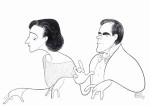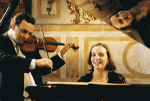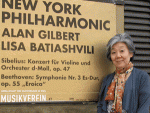Title
In an advertisement for Credit Suisse, global sponsor of the New York Philharmonic, Alan Gilbert, the orchestra’s music director, comes face-to-face with Philharmonic violinist Yoko Takebe. The tagline: Alan Gilbert Meets His Toughest Critic. His Mother. Is there truth in advertising?
Misha and Cipa Dichter met on their first day as piano students at Juilliard and are still together nearly 50 years, multiple recordings, and two children later. Misha commissioned this drawing from the illustrious caricaturist Al Hirschfeld on the occasion of the couple’s 30th anniversary, in 1998.
(Photo by Al Hirschfeld)Gil and Orli Shaham didn’t perform together until long after they’d each left Juilliard—they developed as individual musicians by their parents’ design—but a few years ago they started recording and performing together.
(Photo by Oliver Rieger)Body
Did brother and sister Gil and Orli Shaham grow up practicing together and planning to be career partners?
What underlies the enduring success of husband-and-wife piano duo Misha and Cipa Dichter—from student days to marriage, children, and career commitments?
When musical genes are passed down through generations or shared across a single one, family relationships can come with all kinds of possibilities—opportunity, extra pressure, in-house mentors, close scrutiny, emotional support, fast-track learning, built-in communication skills, struggles with public perception. We know plenty about the lives of the precocious Mozart children—Wolfgang and his older sister Nannerl—whose papa, Leopold Mozart, taught to play keyboard and then swept around Europe on concert tours. The son’s talents as a performer and composer quickly—and forever—eclipsed the father’s.
In 19th-century Germany, two of pedagogue Friedrich Wieck’s daughters, Clara and Marie, studied piano with their father and went on to long lives in music. Another of Wieck’s students, Robert Schumann, fell in love with Clara, the two eventually marrying against her father’s wishes, having fought him in court for the right to do so. Theirs became one of music’s great stories of love and devotion—with her career as one of the 19th-century’s greatest pianists, his as an illustrious composer—and a lively family of eight children.
For size of family tree and magnitude of talent, though, who can beat the Bach dynasty, stretching over two centuries, generation after generation with musical DNA? The most famous Bach, Johann Sebastian, studied violin with his father, Johann Ambrosius, then keyboard with an older brother. In turn, he taught his own 20 children, and also took time from all those cantatas, passions, concertos, suites, and fugues to produce keyboard notebooks for both his eldest son, Wilhelm Friedemann, and his second wife, Anna Magdalena, the musically trained daughter of a trumpeter. W. F. and several of his brothers, including Carl Philipp Emanuel, who had intended to be a lawyer, emerged from that intense (one imagines) household to become organists and composers.
Some members of Juilliard’s several hundred multi-musician families agreed to talk about the experience of having more than one musician (although perhaps not 20!) at home.
Fostering Creativity and Discipline
In her youngest years, it didn’t occur to soprano Arianna Zukerman (B.M. ’95, voice) that there might be life without music—or well-known parents. “Growing up, a lot of people had parents who were a little different. Everybody’s dad did something impressive,” Arianna, whose dad is violinist-violist-conductor Pinchas Zukerman (Professional Studies ’69, violin), music director of the National Arts Centre Orchestra in Ottawa, told The Journal. “I went to Brown [University] with Marlon Brando’s daughter. Then I transferred to Juilliard—and I became ‘Marlon Brando’s daughter.’ It was at Juilliard that it became evident that my family had achieved what everybody there was aspiring to.”
Arianna, like many other children of musicians, started music lessons as a preschooler. It was a given. “It was actually more my mother [Eugenia Rich Zukerman (B.S. ’67, flute)] who was entrenched in the belief that learning an instrument gives ownership over creativity, that an instrument teaches discipline. I chose piano. I used to lie under the piano, and I loved the sound,” she said. Well, actually harp had been her first choice. “But my father said, ‘do you really want to schlep that thing around the rest of your life?’” Eventually her instrument case got even lighter; today she sings on operatic and concert stages. “I started voice lessons at 15—I’m a ham,” Arianna said.
Because Juilliard faculty member Yoko Takebe (Diploma ’64, violin) and her husband, Michael Gilbert (B.M. ’64, violin), are both violinists (she’s been in the New York Philharmonic since 1979; he retired from the orchestra in 2001) there were “plenty of violins—all sizes—around” when their children were growing up. Yoko and Michael encouraged Alan (Pre-College ’85; M.M. ’94, orchestral conducting) and Jennifer (Pre-College ’87; M.M. ’96, violin), who’s now the concertmaster of the Orchestre National de Lyon, to try lots of things. “We played quartets at home—Michael would play cello and I played viola,” Takebe told The Journal. “Alan started piano lessons when he was about 6; we thought piano was important. In grade school he played jazz drums; we bought a trap set and there was a good teacher.” The family introduced formal lessons only after they had determined as a family that Alan and Jennifer would go to Pre-College. “Conducting was always a subject in our household because Michael is a conductor and Michael’s father was a conductor,” Takebe said. “We talked about how conductors influence players.” The Pre-College teachers told Alan’s parents that his confident hand was the first to go up when they asked for conducting volunteers.
Pianist Orli Shaham (Pre-College ’93; Barnard-Columbia-Juilliard Exchange ’97, piano) and her brother violinist Gil Shaham (’90, violin) had scientist parents who had a deep passion for music and made it central in their home. “In the Israel in which we grew up, all kids played music,” Orli told The Journal. “But [Gil] wouldn’t let me touch his violin. Our older brother, Shai, who’s a scientist now, played piano. He had no control over my touching that. So I did. I tried cello and flute, too.” After the family moved to the U.S., she followed Gil to Pre-College at Juilliard, but they were four years apart and, other than some occasional informal sonata sight-reading, never performed together in those impressionable days. Unlike young Fanny and Felix Mendelssohn, who famously learned the rudiments of musicianship side-by-side and remained closest professional confidants for life, the Shahams developed as individual musicians, away from each other’s shadows—and possible sibling competition. “And that was by our parents’ design, which I think was smart,” Orli said. She and her husband, David Robertson, the music director of the St. Louis Symphony, have 4-year-old twins who have “music oozing out of them. I let them fool around with a lot of instruments now to pick one” later. (Gil’s wife, Adele Anthony, a Juilliard grad, is an assistant faculty member.)
Older Voices Were Louder Voices
For the Brown siblings, five pianists who grew up in Utah who now perform together as the 5 Browns, things came about differently. “Deondra (B.M. ’01, piano, M.M. ’03, collaborative piano) and I auditioned for Juilliard at same time,” Desirae Brown (B.M. ’01, piano, M.M. ’03, collaborative piano), the oldest (by a year) of the quintet, told The Journal in a recent phone interview. She and Deondra both studied with Yoheved (Veda) Kaplinsky—“and I remember calling home and saying the others should study with her, too,” she said. Soon enough Gregory (Pre-College ’00; B.M. ’04, M.M. ’06, piano), Melody (Pre-College ’00; B.M. ’04, M.M. ’06, piano), and Ryan (Pre-College ’03) had come to New York. “For five years, we had some kind of overlap at Juilliard and all of us studied with Veda. If there was any downside, it might have been the younger ones felt pressured to live up to a standard,” Desirae added. In a separate interview, Gregory recalled that “there really was more comfort than pressure or anything from having the same teacher. One of the first things I learned at Juilliard is that no two musicians are alike. You all have strengths and weaknesses. The more shared experiences we had, the more we could relate to each other, help each other grow,” he said.
“We gave each other inspiration to play at a high level, but no feedback—unless it was asked for,” Desirae noted. Competition at the keyboard was pretty much out. “If three of us learned, say, the Chopin G-minor Ballade, it would be that we played it differently. But Deondra and I were competitive with grades. So were Melody and Ryan. And with board games we are all super-competitive.”
When time came for grown-up career choices, there weren’t any five-piano ensemble role models—and few five-sibling musical acts of any kind. The Browns even debated among themselves if their ideas could work. But, Gregory remembered, “We started with the same general vision—to put classical music out there in our own way.” Still they had to reconcile five different perspectives on how to do that. “The details may have gotten us into some slight conflicts. We weren’t used to being co-workers. We started off as siblings and had petty arguments. Older voices were louder voices. Coming to respect each other as equals was a learning process,” he said.
As a professional five-piano performing ensemble, they had to learn how to share more than music, though Desirae laughs at how easy the division of labor seems now. “Deondra does the business: e-mails, schedules, etc. She’s super-organized. Greg talks to arrangers. Melody and I coordinate what we wear—we’ve always had a fun thing with fashion. Ryan is our online techie,” Desirae said. In performance they play in various combinations—solo, four-hands, two-piano, trios, and as a quintet—and choose repertory specific to individual strengths, giving each Brown a turn in the spotlight. As with many chamber music groups, one veto can cancel programming a particular piece. “But when we have creative discussions I’m glad there are five of us so there is a swing vote,” Desirae said. In performance, however, “so much is understood and unspoken. With five of us, because we are so similar, it just takes a look, where even with my husband [violinist Bryan Hernandez-Luch of the Catalyst Quartet and a current Juilliard master’s student] I might talk everything out,” she added.
Doors Open for a Lot of Reasons
“A big difficulty of being siblings in the same business is that people can’t identify you as individuals. Everybody has to get past that perception,” observes Orli Shaham, whose pairing with her brother happened almost by accident. She and Gil had already launched separate solo careers, when, 15 years ago, a radio station asked them to perform together. “We played the one piece we had grown up sight-reading together—Dvorak’s Sonatina” for violin and piano (which, incidentally, Dvorak composed for his son and daughter). “Gil’s producer from Deutsche Grammophon happened to be there, and he said ‘you have to record’,” Orli continued. Since then, the siblings have done major joint recording and touring projects every other year. “It took off quickly. We always come to it as equals,” she said. They plan to release a CD of Hebrew melodies (including one composed for them by Avner Dorman, D.M.A. ’06, composition), this spring on Canary Classics, Gil’s label.
The Shahams keep projects limited and separate from their solo work, Orli said. “Gil’s always been great about no petty childish sibling things. I rarely play oom-pah stuff with him. We split the fees and all that. [Ours] is a specific collaboration, not because he needs an accompanist. And that’s part of why we get along so well.”
Even though the Shahams have only made music together professionally as adults, critics—and they themselves—hear their musical styles as being remarkably alike. “I’ve often wondered about that,” Orli said. Having listened to the same recordings at home with their parents, she thinks she and Gil were undoubtedly influenced from an early age by the sounds and styles of Rubinstein, Horowitz, Heifetz, David Oistrakh—“even when it was the other person’s instrument.” Today Shaham influences Shaham and vice versa. “We are absolutely each other’s critic, although our most harsh critic is our brother, Shai, who is an excellent pianist,” she added. “I’ve learned so much from Gil as a musician—certain things about phrasing, especially in the recording process. Tempos always feel slower when you are listening back. There are rewards in working with someone you trust with your life.”
Even with that level of trust, stepping into the spotlight with a family member can be nervous-making, especially when it is a parent-child relationship. Zukerman father and daughter have shared professional appearances, most recently in November with Spain’s Royal Philharmonic Orchestra, of which Pinchas Zukerman is principal guest conductor, but there haven’t necessarily been shortcuts to working together.
Arianna recalled that before she transferred from Brown to Juilliard, “my dad told me with reverence and fear about his ear-training teacher. Then it turned out I had the same one—Mary Anthony Cox—who influenced both of us profoundly. I heard great stories about [my dad’s] stand partners, and [I realized] that he has had a profound musical influence on so many people,” she said. “Although I’ve kinda stayed away from string players sometimes because I had to find my own way. Professionally it can still be hard. Some think I’ve been given opportunities because of my parents. And I was always questioning why someone was interested in me,” she said, taking a confident breath. “Doors open for a lot of reasons, but I have to stand in the room by myself. And I’ve been invited back many places—you don’t get invited back because of who your parents are. It’s tough in music—the constant need to prove yourself.”
Along with nervousness, the familial emotional stew can be mixed with extra dollops of excitement and pride. Yoko Takebe was first conducted by her son, Alan Gilbert, when he was still a student. “Michael and I both played [in that concert], to support him,” she said. “It is a really unique thing to do when your child is conducting.” And yes, she admits, even today she does occasionally tell him her thoughts about his work—“but it has to be encouraging.” Takebe remembers her son’s first guest appearance conducting his hometown orchestra, in 2001. “That was very special—nervous, exciting. I think it was Beethoven’s Sixth Symphony, which is kind of a courageous undertaking because it is not a smashing crowd-pleaser. So I was even more worried [than he was]. But he didn’t want a flashy piece to start with.” Last spring when the New York Philharmonic was on tour in Vienna—for its first time there with Gilbert as music director—a colleague said to her, “Aren’t you excited—the Musikverein, your son conducting Mahler?” “And that’s when it suddenly dawned on me—how amazing it was. I was really moved,” she says.
Don’t Let Him Overpower You
Perhaps the most complex relationship for musicians is between spouses. How do they do it all—home, kids, travel, practice, performing, together 24/7—and stay friends, colleagues, and married? Robert Schumann lamented in the diary he and Clara, his wife, muse, and a composer herself, kept jointly, “Clara has composed a series of small pieces, which show a musical and tender ingenuity such as she has never attained before. But to have children, and a husband ... does not go together with composing. She cannot work at it regularly, and I am often disturbed to think how many profound ideas are lost.”
Misha Dichter (B.S. ’68, piano) and Cipa Glazman Dichter (B.M. ’68, piano) met in the fall of 1965, shortly after they entered Juilliard, both to study with the great Rosina Lhévinne. Not only did they become romantically involved right away, they also started playing four-hand and two-piano pieces. “It happened so naturally. There was no big master plan. We hung out in a group, and it was a salon kind of thing when we would read music,” Cipa told The Journal. “After an 11-hour day, in class and practicing, we would repair to someone’s apartment and pull out the four-hand Schubert,” added Misha, whose solo career rocketed when he won a medal in the 1966 International Tchaikovsky Competition. By the time they married (he says, “She proposed to me in Paris;” she says, “I don’t recall proposing to him”), Cipa had pretty much stopped practicing, extending her hiatus until after the birth of their first child. Their first joint appearance was at the Hollywood Bowl in 1972; out came the E-flat Major Concerto for Two Pianos of Mozart (which the composer had written to play with his sister).
The Dichters have since recorded the complete Mozart works for four-hands and performed hundreds of times as a duo, never using page turners—Misha glues pages together and copies them as one long score—as they find even nodding interrupts the intimacy of performance. At Juilliard, Mme. Lhévinne, no doubt reminded of her own marriage, to the legendary Josef Lhévinne (who was on the Juilliard faculty from 1924 until his death, in 1944), watched over the couple as more than a mentor. “She caught us holding hands once in a Juilliard master class and said, ‘I only told Mr. Lhévinne’—always Mister Lhévinne—‘I am fond of you before I married him. I did not tell him I love you’,” Cipa recalled. “And then another time after she heard us play,” Misha said, “she came back and yelled at Cipa, ‘Don’t let him give it to you like that. Don’t let him overpower you’.”
“Some women have asked me ‘why are you not playing on your own?’” added Cipa, who always plays first piano to her husband’s second. (She says, “a gentlemanly thing to do.” He says, “it fits with our playing styles.”) “But this fell into place. And it works for me.”







